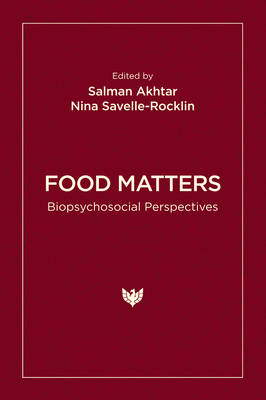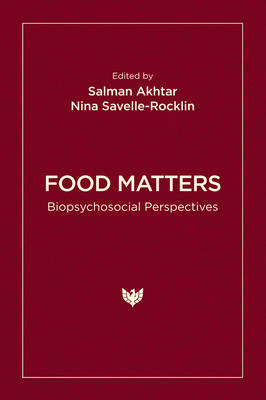
- Retrait gratuit dans votre magasin Club
- 7.000.000 titres dans notre catalogue
- Payer en toute sécurité
- Toujours un magasin près de chez vous
- Retrait gratuit dans votre magasin Club
- 7.000.0000 titres dans notre catalogue
- Payer en toute sécurité
- Toujours un magasin près de chez vous
Food Matters
Biopsychosocial Perspectives
Livre broché | Anglais
49,95 €
+ 99 points
Description
With contributions from Prachi Akhavi, Salman Akhtar, Cuneyt Iscan, Surreya Iscan, Alan Michael Karbelnig, Kelsey Leon, Clara Mucci, Nina Savelle-Rocklin, Asmita Sharma, Julian Stern, and Thomas Wolman. Food matters begin even before birth with the absorption of nutrients in the womb and continue through baby feeds, family meals, school dinners, barbecues with friends, and romantic meals to the growing dietary restrictions of old age. The role of food is not limited to its life-giving necessity but plays a huge role in communal bonding, cultural tradition, and self-expression. Food Matters investigates the significant role that food plays in all of our lives and is divided into three major sections: Mostly biological, Mostly psychological, and Mostly sociological. 'Mostly' because biology, psychology, and sociology are not hermetically sealed subject areas and overlaps into other fields are to be expected. Part I: Mostly biological consists of two chapters. The first pertains to food and health, the second to food and illness. At its core, Chapter One aims to undermine the notion of 'healthy choices' and demonstrate a more nuanced vision of what actually builds healthy communities. The varied case material of Chapter Two shows the myriad roles food can play in relation to illness. Part II: Mostly psychological has four chapters, which respectively address the relationship between food and sexuality, aggression, narcissism, and morality using wide-ranging theory and practical case examples. Part III: Mostly sociological has three chapters. The first pertains to money, the second to immigration, and the third to movies, again packed with relevant theory and clinical vignettes, and, in the case of the final chapter, using the movies Waitress and Babette's Feast to show the central role food plays, even in our fictional lives. This welcome smorgasbord of ideas from an international array of contributors representing the disciplines of psychiatry, psychology, psychoanalysis, anthropology, and gastroenterology will be essential reading for professionals and academics in those fields and will shed fresh light on the subject for anyone with an interest in the multifaceted meanings of food matters.
Spécifications
Parties prenantes
- Editeur:
Contenu
- Nombre de pages :
- 240
- Langue:
- Anglais
Caractéristiques
- EAN:
- 9781800132023
- Date de parution :
- 14-09-23
- Format:
- Livre broché
- Format numérique:
- Trade paperback (VS)
- Dimensions :
- 150 mm x 229 mm
- Poids :
- 5347 g

Les avis
Nous publions uniquement les avis qui respectent les conditions requises. Consultez nos conditions pour les avis.





